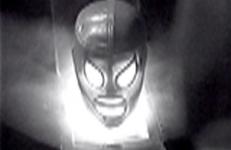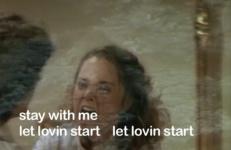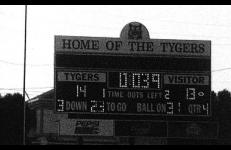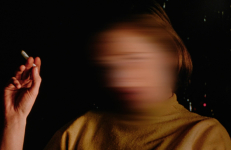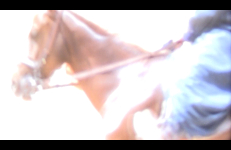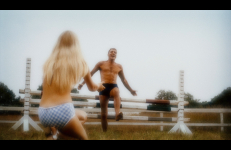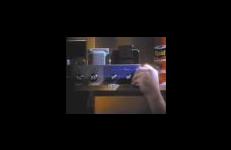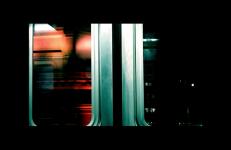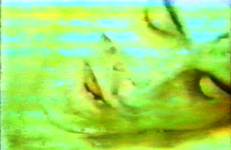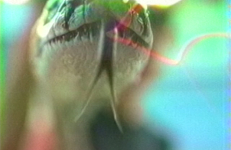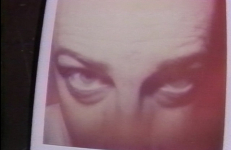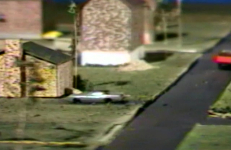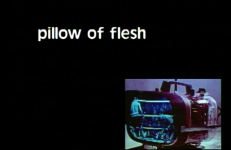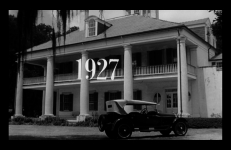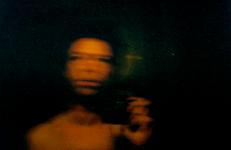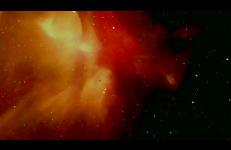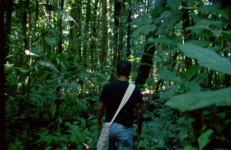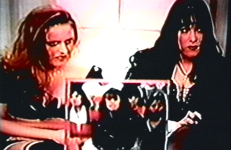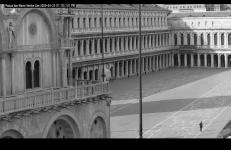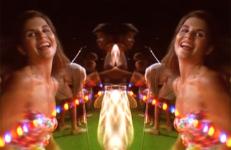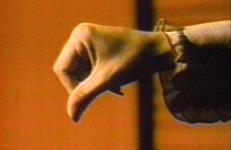In The Great Mojado Invasion (The Second US - Mexico War), writer/performer Guillermo Gómez-Peña and filmmaker Gustavo Vazquez combine Chicano wit and political vision to create an ironic, post-millennial and postmodern look at the future of U.S./Mexican relations. Both artist and director generate a complex commentary on history, society, pop culture, the politics of language and the repercussions of ethnic dominance.
Found Footage
In The Great Mojado Invasion (The Second US - Mexico War), writer/performer Guillermo Gómez-Peña and filmmaker Gustavo Vazquez combine Chicano wit and political vision to create an ironic, post-millennial and postmodern look at the future of U.S./Mexican relations. Both artist and director generate a complex commentary on history, society, pop culture, the politics of language and the repercussions of ethnic dominance.
Plagued by blindness, sloth, and devotion, a troubled scene from Little House On The Prairie offers itself up to karaoke exorcism.
— Michael Robinson
Home is about disappointment in northern Ohio. The scoreboard depicted is on the grounds of Mansfield Senior High. The sentiment conjures the close call.
This title is only available on Broad Daylight and Other Times: Selected Works of Kevin Jerome Everson.
"Superimposing the stories of two women—the filmmaker’s late grandmother and the amateur filmmaker Joan Thurber Baldwin—Home When You Return explores the psychogeographies of mourning through a variety of modes, from documentary to melodrama. Emptied and put up for sale following its matriarch’s passing, the family home becomes the site of a winding tour through polymorphic representations of the past in media and memory." - NYFF Currents
A poem or brief poetic collage of 16mm home movie footage from Egypt in the 1950s along with elements of Capra's Lost Horizon soundtrack interwoven with recordings of a small and frustrated boy.
The original footage was given to me by my mother, who worked some 30 years as a maid for the millionaire couple who shot this while on an around-the-world honeymoon trip. The woman’s voice pondering utopia, peace and joy; the small boy frustrated by the tonal and linguistic romanticism of this expression.
An allegory recycling images from the past, still relevant to the present moment.
“Horses are lucky, they’re stuck with the war same as us, but nobody expects them to be in favor of it, to pretend to believe in it.”
— Louis-Ferdinand Céline, Journey to the End of the Night, 1932
A hyper-collage endurance test of sado-masochistic proportions, mixing an anthology of corporate video music with a feng shui video.
This title is also available on Animal Charm Videoworks: Volume 2, Hot Mirror Mix.
Sable Elyse Smith's How We Tell Stories to Children is a single channel video that combines found footage, music clips, and audio of the artist reading with video clips of her father recording himself from prison. Focal points and significant moments seem to always occur just offscreen, or quickly flash away.
The Hundred Videos is a project undertaken by prolific video artist Steve Reinke, including 100 video works made from 1989-1996. Discussing death, sex, the body, philosophy, and contemporary art, The Hundred Videos defines a unique style of video-essay for the end of the 20th Century.
"Each disquieting image breaks down into a pixel, each pithy phrase into a word, and Reinke's stream of video-thought continues apace. The corpse won't stop talking."
— Jon Davies, Images Festival: Spotlight Essay, April 2018
The Hundred Videos is a project undertaken by prolific video artist Steve Reinke, including 100 video works made from 1989-1996. Discussing death, sex, the body, philosophy, and contemporary art, The Hundred Videos defines a unique style of video-essay for the end of the 20th Century.
"Each disquieting image breaks down into a pixel, each pithy phrase into a word, and Reinke's stream of video-thought continues apace. The corpse won't stop talking."
— Jon Davies, Images Festival: Spotlight Essay, April 2018
The Hundred Videos is a project undertaken by prolific video artist Steve Reinke, including 100 video works made from 1989-1996. Discussing death, sex, the body, philosophy, and contemporary art, The Hundred Videos defines a unique style of video-essay for the end of the 20th Century.
"Each disquieting image breaks down into a pixel, each pithy phrase into a word, and Reinke's stream of video-thought continues apace. The corpse won't stop talking."
— Jon Davies, Images Festival: Spotlight Essay, April 2018
The Hundred Videos is a project undertaken by prolific video artist Steve Reinke, including 100 video works made from 1989-1996. Discussing death, sex, the body, philosophy, and contemporary art, The Hundred Videos defines a unique style of video-essay for the end of the 20th Century.
"Each disquieting image breaks down into a pixel, each pithy phrase into a word, and Reinke's stream of video-thought continues apace. The corpse won't stop talking."
— Jon Davies, Images Festival: Spotlight Essay, April 2018
The Hundred Videos is a project undertaken by prolific video artist Steve Reinke, including 100 video works made from 1989-1996. Discussing death, sex, the body, philosophy, and contemporary art, The Hundred Videos defines a unique style of video-essay for the end of the 20th Century.
"Each disquieting image breaks down into a pixel, each pithy phrase into a word, and Reinke's stream of video-thought continues apace. The corpse won't stop talking."
— Jon Davies, Images Festival: Spotlight Essay, April 2018
A found footage film, Hush… condenses a classic Hollywood horror of the 1960s into a series of brief and haunting vignettes. A heated argument in crumbling plantation mansion. A murder in the summerhouse. A severed head rolls down the stairs. A severed hand lies on the floor. Who perpetrated these vicious acts? By removing the central elements of the narrative, Henricks shifts our attention to the periphery; to those objects, mechanisms and conventions to which we seldom pay attention.
You never thought that Franco-American relations could be so fun! A French thriller in the tradition of the Marquis de Sade, getting it on with Roger Corman's from-the-hip philosophy.
This title is also available on Animal Charm Videoworks: Volume 3, Computer Smarts.
"It may indeed be questioned whether we have any memories at all from our childhood: memories relating to our childhood may be all that we possess. Our childhood memories show us our earliest years not as they were, but as they appeared at the later periods when the memories were aroused. In these periods of arousal, the childhood memories did not, as people are accustomed to say, emerge; they were formed at that time. And a number of motives, with no concern for historical accuracy, had a part in forming them, as well as in the selection of the memories themselves."
A deceased hoarder, reconstituted through technology, recounts a difficult childhood as inhabitants of a virtual world struggle to reconcile materialistic tendencies. A scientist leads an effort to understand the passage of time, but the data is unreliable. The question remains, what happens to our things after we are gone?
Found-footage video that addresses American racism and the violence that it spawns.
A voyage into the labyrinthine memories of a Uitoto man, who worked for the drug Lords in the Colombian Amazon back in the 80s. Following his path between the forest and the ruin of a Narco's mansion imitating the Carrington mansion in the soap opera Dynasty, the film unfolds the hallucinatory account of a near-death experience.
Screened in the 1997 Whitney Biennial, the video Ladies, There's a Space You Can't Go is both a deconstruction and a distortion of an episode of Sally Jesse Raphael titled My Daughter Dresses Like A Hooker. Sampled audience statements and a driving dance beat merge with distorted talk show participants to form a self-mutilating music video. The daughters "exhibited" walk through the audience as if it were a runway.
Last Man is made of the raw footage of security cameras that stream online. During the spring 2020 lockdown imposed due to the Covid-19 pandemic, Dana Levy, who lives in New York, monitored the images transmitted live from security cameras in city centers and at airports, beaches, universities, restaurants, and zoos around the world. In them, these key venues, which in normal times are bustling with life, appear nearly devoid of human presence.
A very special episode of television's Full House devours itself from the inside out, excavating a hypnotic nightmare of a culture lost at sea. Tropes of video art and family entertainment face off in a luminous orgy neither can survive.
— Michael Robinson
Fuelled by lavish doses of disjointed hyper-editing, super-talented Jim Bailey dances with wild animals in Animal Charm's hot and exciting performance of "Fever."
This is the new choreography of devotion, via the vlog of southern nightmares. This is the light that never goes out. This is the line describing your mom.




